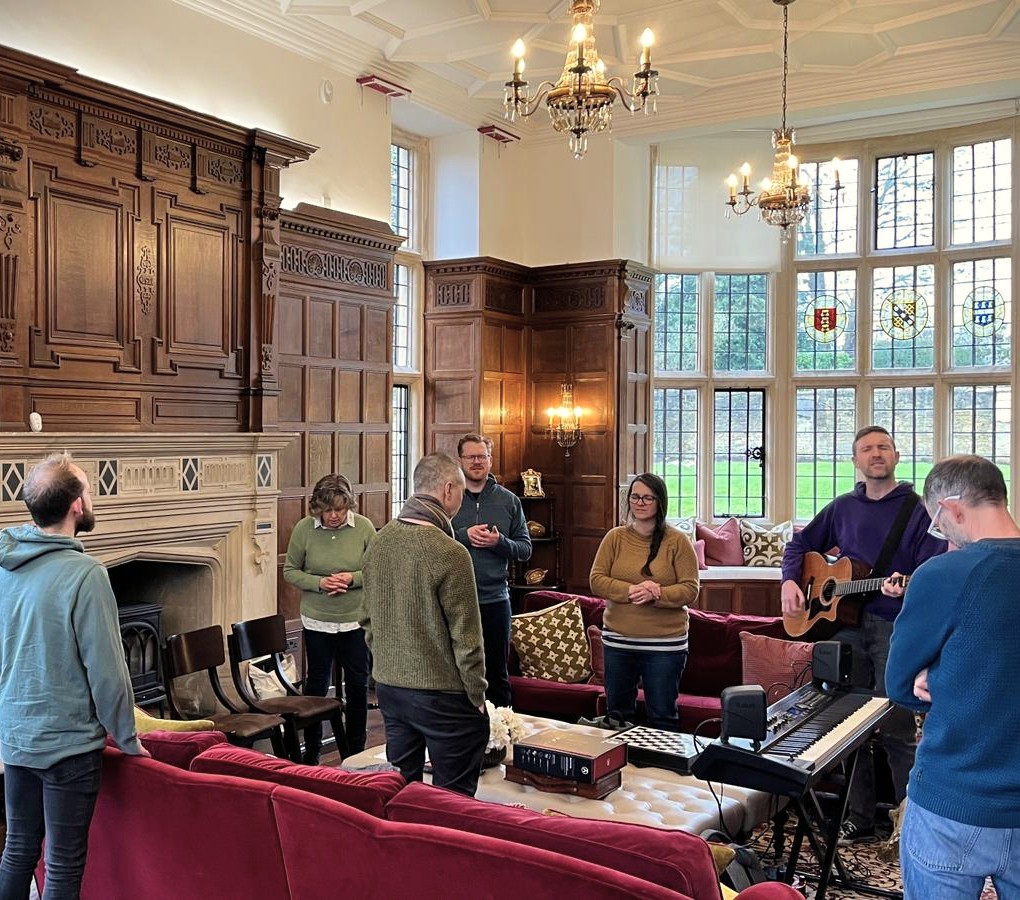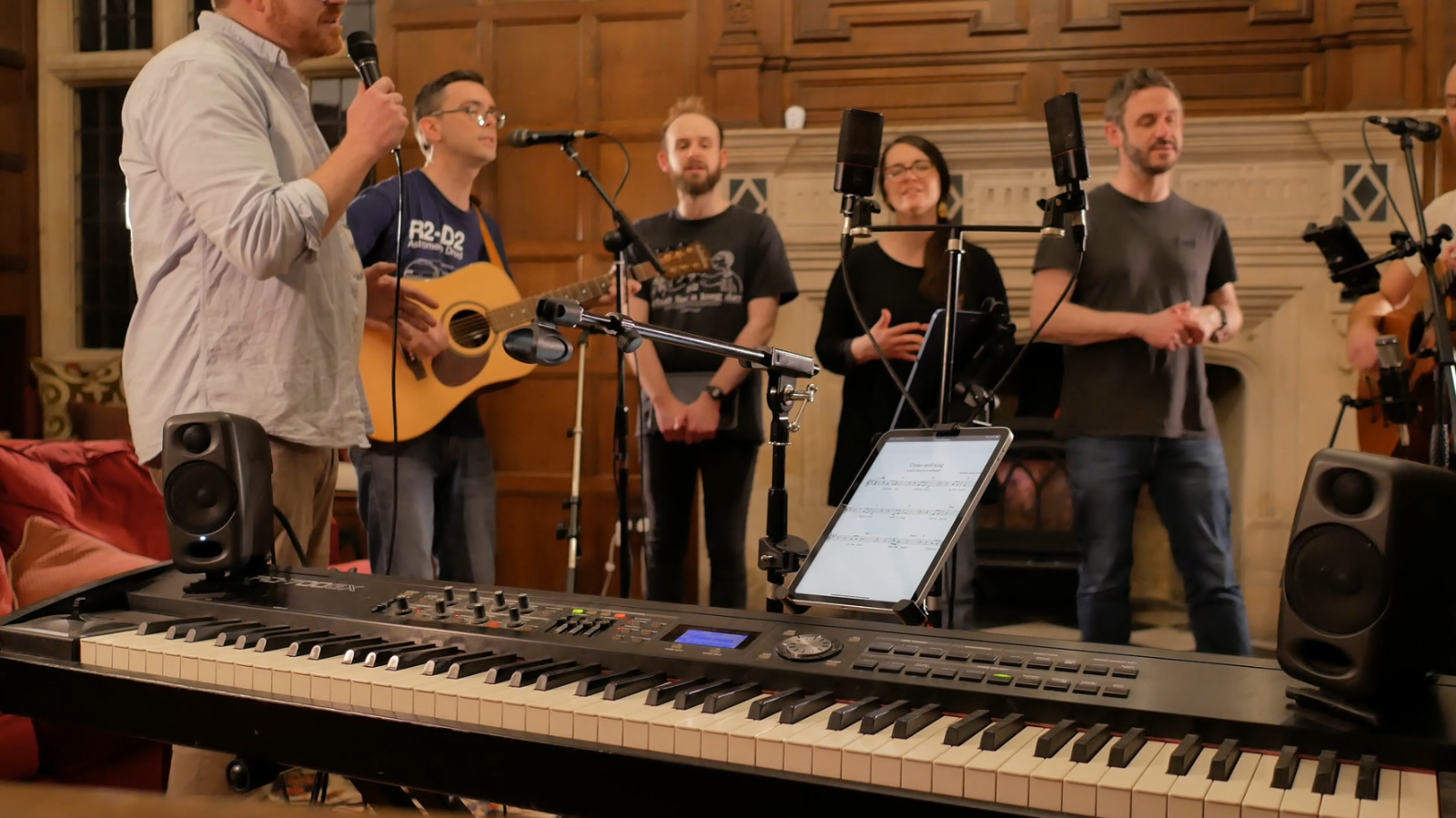All Our Voices: Learning to Write for Community
We've released a new EP – Community Songs Vol.1: All Our Voices.
These are differently-written songs and different-sounding recordings, so a word or two of explanation is probably in order.
THE COMMUNITY
Community has become a huge theme for us in recent years. A decade ago we were a group of about a dozen songwriters, mostly working in local churches, writing collaboratively to release about ten songs a year. We launched the 12 Song Challenge to add a rhythm to our writing and invited others to join us. Then a few years ago it blew the doors off!
During Covid lockdown, hundreds of writers joined us, each writing a song a month, supporting and encouraging one another to serve local congregations. The experience of writing in community began to feel more vital than the challenge itself. And gradually the centre of gravity in our whole organisation shifted from the editorial process and recordings to the writer community. The heart of our ministry was no longer the songs we wrote, but the people writing them.
In response, when we clarified our charity’s vision last year, we named building community as one of our core values alongside glorifying God and growing disciples.
"...community songs is much more than a thematic gap. It's a gap in the practice of contemporary worship and challenges the very models we use."
For years we’ve seen one of our distinctive roles as writing for the gaps in the church's repertoire. We think about what the church needs to sing, look at what's available, and play our part in expanding the vocabulary—recent albums include Doxecology, which engages with creation care, and Downcast Souls Expectant Hearts, marrying themes of lament and eschatological hope. So it was no surprise that the emerging importance of community in our work led to us adopting that theme as our next focus.
What made this different from previous projects was that 'community songs' is much more than a thematic gap. It's a gap in the practice of contemporary worship and challenges the very models we use.
THE PROBLEM
Over recent decades, ‘contemporary worship music’ has become an established musical genre, with big songs, big events, big labels, big names and all the commercial dynamics of the wider music industry. Worship leaders choose from a narrow selection of ‘hits’ and, in order to reach that level, you need a radio-ready recording that gets noticed by the social media algorithms.
"...the problem with the big sound is that it is indifferent to the voices in the room. It just goes ahead regardless."
That means we get a certain type of song: a complex structure, elaborate production, and an ear-catching lead vocal, all of which reward repeat listening. In turn, so many churches have geared their Sunday music to be lead-vocal-centric and mimic that 'big' sound.
But the problem with the big sound is that it is indifferent to the voices in the room, it just goes ahead regardless. If we were hoping to expand the repertoire of 'community songs', we couldn’t simply write new songs in that same mould. We needed to recapture something of the organic, interactive, communal spirit of early contemporary worship, and ask how some of those threads could reemerge today.
So we booked a retreat centre in Oxfordshire for a small group of us to gather and try out some ideas.

Trying out community songs at the Oxfordshire retreat
THE RETREAT
This was not an album-writing retreat. To make that our focus would hide the very thing that we were trying to discover. We chose to discipline ourselves to write songs only for those days together, with no other context in view.
The first night was spent catching up with one another, sharing the highs and lows of our lives, and discussing what we'd been reading on the subject of Christian community. The next three days, we met in the morning for Biblical input on the theme, and then dispersed to write songs that we would use to lead one another in worship before lunch. Our challenge was to make the songs as accessible as possible–there was no time to let a new song bed in–and as specific as possible. We gave extra points for songs that could have no conceivable use at any other place or time!
At the end of each morning, we would regather, organise what we’d written into some sensible order, and lead one another in those songs. Quite different from the model of one worship leader who plans and leads everything.
"...the way [the songs] made room for our particular voices, lives and experiences made them profoundly communal."
It took time to let go of some of our long-held habits and expectations but, over several days as we produced dozens of song ideas, a pattern began to emerge. I'll try to describe some of the common features:
- Simple structure. Many were short refrains only, or single verse-chorus, which made them easy for a room full of voices with a couple of acoustic instruments to learn and sing.
- Specific lyrics. We mentioned people by name, wrote about very specific situations, referenced the specific phrases used in the teaching session.
- Interactive design. Many songs had space for short extemporary prayers, opportunities to contribute lyrics on-the-fly, or a call-and-response structure.
- Thematically and emotionally diverse. It's surprising how much creativity is released when you're not trying to temper your approach to suit a generic wider audience.
Those lunchtime sessions were some of the most personal, communal and powerful times of worship I have experienced in recent years. The songs kept God as the focus, and didn’t always speak in explicit terms about us, but the way they made room for our particular voices, lives and experiences made them profoundly communal.

An early recording attempt with too many microphones
THE RECORDING
Towards the end of the retreat we began to consider how we might share what we had learned and experienced, either to inspire our writer community or to encourage churches in this model of worship. The songs we’d written mostly wouldn’t make sense elsewhere, and when we tried recording and filming a few on the last night it ended up looking inauthentic and self-conscious, lacking the vitality of community that was the true heartbeat of the songs. And anyway, we weren’t at all sure by now that sharing our own songs could be the answer to the question we were asking.
But after we got home, to our surprise, the WhatsApp group began pinging with people saying that they'd led one of the songs with their own worship team, in their small group, or at a conference. After tasting worship in that different, communal way we'd all experienced, this was now how we wanted to lead our own communities—and the only songs we had were the ones each other had just written.
"...the songs themselves are less important than the people singing them."
Those few songs, which clearly had an organic life beyond the initial gathering, were what convinced us to go ahead and record our first Community Songs EP at our songwriting retreat at Wydale Hall in the summer.
Everything we had explored and experienced so far had led us to one core conviction: the songs themselves are less important than the people singing them. So that had to shape our approach to recording. If we focused on production standards, instrumental arrangements or choreographed structures we would betray that conviction. These were simple songs that relied on the voices and dynamics of the people in the room to make them work. So we threw up a few ambient mics, handed out a few cameras and just dived into an acoustic worship session.
What you hear on the EP is edited down a little for time, but it's basically exactly what happened.
THE EP
We release this collection in the hope these songs might serve your community. These are three that have caught on among our community in the old-fashioned, organic way. We know they work. The recordings model a way you can lead them, but they are not intended as a fixed arrangement to be reproduced, ad libs and all. You can expect that they'll be different with every group, every time.
More than that, we hope that they serve as a prompt for a different kind of contemporary worship practice. This kind of simple, customisable song is not fashionable at the moment, but you can find other examples if you dig a little, especially into some of the old songbooks. Or, even better, we encourage you as a community to write your own!
We’re not saying you need to throw out all the big songs. But if you have the courage for a moment to switch off the PA system, open the floor, and let the voices become the dominant sound in worship, something special just might happen.
Community Songs Vol.I: All Our Voices is the first in a multi-volume collection, documenting our journey into community-oriented worship and showcasing some of the songs that have been born out of it.